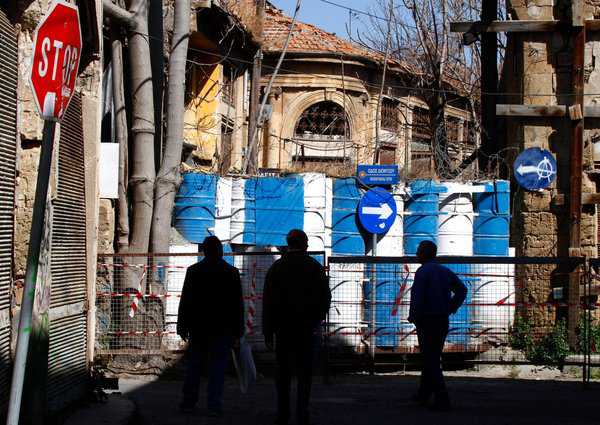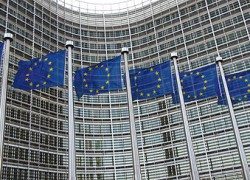A protester yells at policemen during a protest by employees of soon-to-close Cyprus Popular Bank, the island’s second-largest lender, outside the Parliament in Nicosia, March 21, 2013. (photo by REUTERS/Andreas Manolis)
Read more: http://www.al-monitor.com/pulse/originals/2013/03/cyprus-gas-reserves-negotiation-moscow-concern-turkey.html#ixzz2ONezxHc0
By: Semih Idiz for Al-Monitor Turkey Pulse
Normally, an article on Cyprus would stir little excitement despite that UN peace keepers have been stationed between the Turkish North and Greek South of the Island for nearly forty years, and a formal peace has not been declared. Cyprus is not, after all, an active conflict zone, and has not been since the present status quo was established in 1974.
About This Article
| Summary :
Negotiations between Nicosia and Moscow over gas reserves off the southern Cyprus coast are being watched with concern by Ankara, which does not accept Nicosia’s claim to full sovereignty over these reserves, writes Semih Idiz.
Author: Semih Idiz |
That was the year when Turkey invoked its “rights of guarantee” under international agreements and invaded Cyprus, following an Athens-led coup by Greek Cypriots aiming for union with Greece, which has been a historic red line for Turks.
Today, however, eyes are focused on the Island and it has nothing to do with Turkey or Turkish Cypriots. By a strange quirk of history, it is the European Union that is being vilified by Greek Cypriots this time, as the ogre out to impoverish and destroy their nation.
In fairness to them, few nations have been asked to swallow the kind of pill that they are asked to swallow. Imagine 10% of your savings being scooped off by the government against your will in order to get billions in assistance from the EU to prevent a collapse of the economy.
What compounds the “Greek tragedy,” however, is that Greek Cypriots are damned if they do, and damned if they don’t. If they swallow the pill, they will be poorer than they were a few weeks ago. If they don’t, their economy faces total meltdown. It would be easy to surmise that there is an element of schadenfreude among Turkish officials observing these developments.
But not all Turks feel that way. Besides Turkish officials are also following developments in Cyprus with growing concern. There are a number of reasons for this which could force the Cyprus problem to the top of the international agenda again, resulting in headaches for Ankara, too.
One potential source of trouble is Russia, whose citizens have parked billions of Euros in offshore accounts in Greek Cyprus over the years, and who are now crying foul because they risk loosing large amounts of money. Moscow is angry at the EU and Nicosia for coming out with a bailout package behind its back, even though the matter involves the interests of tens of thousands of Russians.
Meanwhile, the rejection of the EU’s bailout plan by the Greek Cypriot parliament has left Prime Minister Nicos Anastasiades with no choice but to turn to Moscow, “begging bowl in hand,” as some analysts are putting it, to try and secure the necessary funds from Russia for the EU’s bailout plan to come into force.
EU officials also say Moscow has to contribute to saving the Greek Cypriot economy seeing as Russians have billions of Euros invested there. There is of course an irony here of epic proportions. The EU is relying on a non-EU power, with which it has economic and political rivalries on a number of levels, to save one of its own members.
Ordinary Greek Cypriots must be wondering why they joined the EU if it is not there to help them on such a day, relying instead on Russia to do it. But more than one analyst suggested at the time that Greek Cypriots, who already had a relatively high standard of living, only joined the EU in 2007 because of the leverage they believed this would provide over Turkey.
The assumption, according to these analysts, was that Ankara’s great desire for EU membership would place Nicosia in a position to dictate its terms for a settlement to the Cyprus problem. Whatever the merits of this argument, Ankara’s desire for EU membership did not make it “pliable” in the manner Greek Cypriots would have liked.
On the other hand, while Turkey’s path to the EU may be blocked today due to the Cyprus problem, this has not prevented Turkey’s own economic take-off from happening over these past ten years. In fact, many Turks who look at Greece and Greek Cyprus today are wondering why Turkey should still push for membership in a union that is no longer enriching its members, but impoverishing them instead.
Meanwhile, the Turkish government is following the discussions between Moscow and Nicosia with some consternation. The reason is that Nicosia appears prepared to transfer the lion’s share of the rights over the vast gas reserves said to exist off the southern coast of Cyprus to Russia, in return for financial assistance to overcome its economic crisis.
Ankara, however, rejects sole Greek Cypriot sovereignty over these reserves, arguing that Turkish Cypriots also have a stake in them; not to mention Turkey’s own economic interests in the Eastern Mediterranean. Turkish officials have even suggested that if the Greek Cypriot administration insists on grabbing these reserves for itself, then Turkey will intervene militarily.
What is certain, however, is that there will be complications for Turkey if Russia gains control over these reserves, leaving Ankara and Moscow at loggerheads. It is intriguing that while there is much reporting about the talks between Russia and Nicosia, few seem to be focusing on this very real problem.
Meanwhile there are reports that Russia is not satisfied with just a share of the gas reserves, but has also asked Nicosia for military bases on the Island in order to bolster its presence in the Eastern Mediterranean, which has been weakened with the crisis in Syria, where Moscow has military bases.
Turkish officials are said to be concerned with this prospect, too, given that Moscow has traditionally supported the Greek Cypriots at the Security Council when it comes to efforts at solving the Cyprus problem. It is unlikely, however, that Nicosia will, or even can, grant this request given that it is an EU member with links to NATO, not to mention the British sovereign bases that already exist on the Island.
There are also those who argue that whatever Moscow’s interest in Cyprus may be, it has no interest in upsetting its ties with Turkey given the vast economic cooperation between the two countries, valued at tens of billions of dollars, which are set to increase further and include the strategic field of energy.
In the meantime it must be grating on the already frayed nerves of the Greek Cypriot to hear Western experts argue that succor for them may lie in Ankara, and not Moscow. Writing for the Financial Times (March 21) Timothy Ash, who is the head of emerging markets research at Standard Bank, had this to say: “Greek Cypriots must be thinking that with friends like these, (the EU and Russia, both seeking to extract their pound of flesh for any bailout) who needs enemies? Well, what if Cyprus begins to think outside the box, and what if it goes to its erstwhile enemy, Turkey, for assistance?”
Ash suggests Turkey could provides 7 billion Euros [about $9 billion] in exchange for Greek Cyprus agreeing to the terms of the Annan peace plan for the unification of the island, which was also supported by the EU at the time, but which Greek Cypriots rejected overwhelmingly in a referendum in 2004. Turkish Cypriots had accepted the plan in their separate referendum.
“Peace and unification on the island could then perhaps open up the energy reserves south of the island for joint exploration by Cypriot (Turkish and Greek) and Turkish companies” Ash says. This is an intriguing but highly unlikely prospect given deep rooted anti-Turkish sympathies embedded in the Greek Cypriot psyche.
But who knows? Existential crises have concentrate minds in the past, forcing people to think in novel ways. It is a slim possibility, but the same might happen in Cyprus, although no one should hold their breath.
Semih İdiz is a contributing writer for Al-Monitor’s Turkey Pulse. A journalist who has been covering diplomacy and foreign-policy issues for major Turkish newspapers for 30 years, his opinion pieces can be followed in the English language Hurriyet Daily News. He can also be read in Taraf.
Read more: http://www.al-monitor.com/pulse/originals/2013/03/cyprus-gas-reserves-negotiation-moscow-concern-turkey.html#ixzz2OMv3e7Jn





 The Turkish government declared that it will suspend its relations with the European Union if the Greek half of Cyprus takes the rotating presidency of the Council of the European Union scheduled in July 2012 without first solving the reunification issue between the Greek Cypriots and the Turkish Cypriots. Turkey’s Prime Minister Erdogan stated that Turkey does not recognize Cyprus as a nation.
The Turkish government declared that it will suspend its relations with the European Union if the Greek half of Cyprus takes the rotating presidency of the Council of the European Union scheduled in July 2012 without first solving the reunification issue between the Greek Cypriots and the Turkish Cypriots. Turkey’s Prime Minister Erdogan stated that Turkey does not recognize Cyprus as a nation.